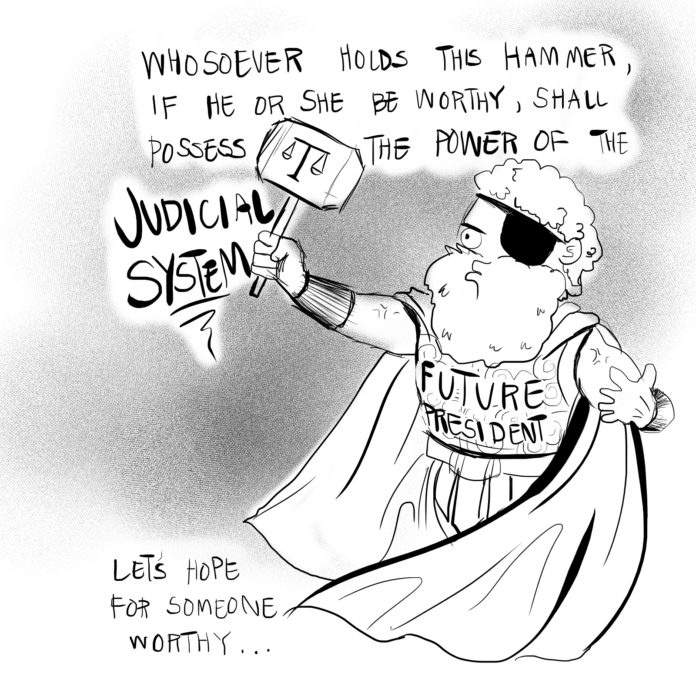When Justice Antonin Scalia died in February from a heart attack at his ranch in West Texas, it sounded like it was ripped from the screenplay of House of Cards. The Senate, led by the majority leader Mitch McConnell, has barred Obama’s Supreme Court Justice nominee, Merrick Garland, on the grounds that the pick should be reserved for the incoming president. In the meantime, more than 1,000 petitions for review have been rejected by the court, including a case about the NCAA’s policy about athlete compensation restrictions. Since it appears McConnell will continue to hold his ground, the future of the vacancy in the Supreme Court and subsequent cases resides in the hands of the next president. The electorate should try to make the best of their choices of presidential candidates. Instead of being so disillusioned, they should consider voting according to the values they want represented in the Supreme Court.
The Supreme Court carries a lot of power: It carries the power to determine whether or not a woman can get an abortion and whether or not gays can marry. This being said, a vote for the next president would likely tip the scales in favor of your preferred party, as the court has deadlocked on more than one occasion since Scalia’s passing. For the sake of this editorial, third party candidates will not be mentioned, as it is unlikely one will be elected president in 2016. Trump has said he wants someone like Scalia. Clinton called Garland a “highly qualified” candidate. Both candidates had the chance to describe their ideal candidate in Sunday’s debate when someone from the crowd asked, “What would you prioritize as the most important aspect of selecting a Supreme Court justice?”
Trump responded by applauding the work of Justice Scalia and said he would like to fill the spot with someone similar. Voters who feel strongly about gun rights might rest easier with Trump’s nominee, as Trump said he would pick someone who respects the Second Amendment. If Trump’s nominee is indeed “cast in the mold” of Scalia, then those who are pro-life would also rest easy, as Scalia believed Roe v. Wade was wrongly decided and should be overturned. Trump’s campaign has created a list of potential nominees, should he win the presidency. A look into the background of these Justice candidates is imperative for those considering voting for Trump.
Clinton listed a few more topics her ideal candidate would address. She said she wanted someone who stands for the ruling of Roe v. Wade and a woman’s right to choose. She also said she wanted someone who upheld marriage equality and who would address current voter registration issues. When challenged by Trump on her hard stance on gun control laws, she said “I respect the Second Amendment, but I believe in comprehensive background checks.” Those who are passionate about women’s and minority rights, as well as enforcing tougher gun control laws, can expect the same from Clinton’s nominee.
While some of the topics mentioned by both candidates might be brought to the court during their first term as president, the roll of a justice extends well beyond four years. Also, Trump’s or Clinton’s pick may not be the only one they make while in office. It is possible the next president could face another vacancy, as several justices are entering their mid-80s — Justice Ruth Bader Ginsburg is 83 years old, and Justice Anthony Ginsburg trails not far behind at 80 years old. This is why it is so important for voters to look past their dislikes for the candidates and consider the future of the Supreme Court.






